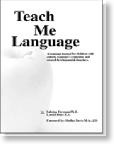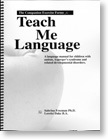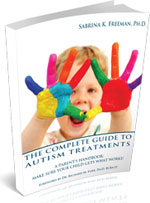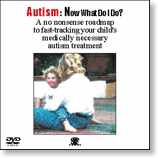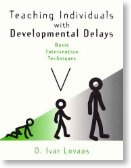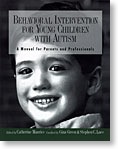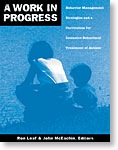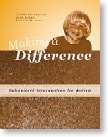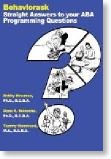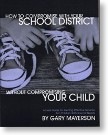speech and language pathology
Do Kids With Autism Eventually Learn to Speak?
19/03/13 15:25 Filed in: autism
An exciting headline that recently caught my eye claimed that a recent study published in Pediatrics found that most children with autism eventually do learn to speak. This claim piqued my curiosity because autism and language is a very big deal; therefore, I had to actually see what the authors in the study found.
Here’s my review of Predictors of Phrase and Fluent Speech in Children with Autism and Severe Language Delay, a study based on the Simon Simplex Collection (SSC), which is a large multisite data base project collecting a variety of information on families who are in some way affected by autism.
Wodka, Mathy and Kalb set out to ask two questions:
Using a very large sample of 372 children with Autism Spectrum Disorder (ASD), these researchers found that higher IQ and less social impairment were good predictors of eventual ability to speak in phrases. They report that 70% of the children in the database eventually learned to speak in phrases by eight years of age, and that 50% of the entire sample eventually became fluent speakers.
For the moment, let’s put aside the few methodological problems with the study (e.g., over-reliance on retrospective parental reporting by using a parent interview [ADI-R] and a parent checklist [Child Behavior Checklist]) and take what these researcher claim as accurate. Every parent is still waiting for the answer to the burning question:
Which treatment programs created such great outcomes? What makes kids with autism talk?
Regrettably, here’s where the study falls short. Although the researchers tip their hat to Behavioral Treatment when they mentioned a prior study by Pickett and colleagues that found participation in Behavioral Intervention programs and IQs over 50 were predictors of developing speech after 5 years of age, these researchers did not actually measure the effect of behavioral treatment programs on the acquisition of speaking in phrases. This omission is unfortunate because the reader is left with the impression that as long as the child has an average non-verbal IQ, and evidence of social interest, the child is likely to spontaneously speak in phrases without intervention. This is an erroneous conclusion because the study did not measure whether the children were in treatment or not. In other words, kids don’t magically attain speech when afflicted with the debilitating disorder of autism - there is usually a lot of heavy lifting involved, in the form of lengthy, intensive and expensive behavioral treatment.
Going forward, I would like to see the researchers control for treatment when studying our children. The study is only valuable if we know which treatments create the outcome of 50% of the entire sample eventually becoming fluent speakers!
One heartening finding in the Wotka et al. study is that there was no relationship found between “stereotyped behavior/repetitive interests” and language acquisition. The take-away message here is that we shouldn’t look at children who are hard to reach because self-stimulatory behavior is blocking the world out as somehow being less able to acquire language.
Children with autism most certainly can acquire language, as long as they have access to quality treatment for the disorder.
Here’s my review of Predictors of Phrase and Fluent Speech in Children with Autism and Severe Language Delay, a study based on the Simon Simplex Collection (SSC), which is a large multisite data base project collecting a variety of information on families who are in some way affected by autism.
Wodka, Mathy and Kalb set out to ask two questions:
- What is the rate of language acquisition of children with autism who, by age 4, had not put words together in phrases? and ...
- What factors did predict when these children would learn to speak in phrases?
Using a very large sample of 372 children with Autism Spectrum Disorder (ASD), these researchers found that higher IQ and less social impairment were good predictors of eventual ability to speak in phrases. They report that 70% of the children in the database eventually learned to speak in phrases by eight years of age, and that 50% of the entire sample eventually became fluent speakers.
For the moment, let’s put aside the few methodological problems with the study (e.g., over-reliance on retrospective parental reporting by using a parent interview [ADI-R] and a parent checklist [Child Behavior Checklist]) and take what these researcher claim as accurate. Every parent is still waiting for the answer to the burning question:
Which treatment programs created such great outcomes? What makes kids with autism talk?
Regrettably, here’s where the study falls short. Although the researchers tip their hat to Behavioral Treatment when they mentioned a prior study by Pickett and colleagues that found participation in Behavioral Intervention programs and IQs over 50 were predictors of developing speech after 5 years of age, these researchers did not actually measure the effect of behavioral treatment programs on the acquisition of speaking in phrases. This omission is unfortunate because the reader is left with the impression that as long as the child has an average non-verbal IQ, and evidence of social interest, the child is likely to spontaneously speak in phrases without intervention. This is an erroneous conclusion because the study did not measure whether the children were in treatment or not. In other words, kids don’t magically attain speech when afflicted with the debilitating disorder of autism - there is usually a lot of heavy lifting involved, in the form of lengthy, intensive and expensive behavioral treatment.
Going forward, I would like to see the researchers control for treatment when studying our children. The study is only valuable if we know which treatments create the outcome of 50% of the entire sample eventually becoming fluent speakers!
One heartening finding in the Wotka et al. study is that there was no relationship found between “stereotyped behavior/repetitive interests” and language acquisition. The take-away message here is that we shouldn’t look at children who are hard to reach because self-stimulatory behavior is blocking the world out as somehow being less able to acquire language.
Children with autism most certainly can acquire language, as long as they have access to quality treatment for the disorder.
Speech and Language Pathologists are the first responders for autism
27/07/12 11:17 Filed in: autism | Asperger's Syndrome

SLPs are often the first professionals to see a child with autism because the child is not developing language in a typically developing fashion. SLPs often recognize autism immediately due to the symptoms of the disorder that include echolalia, delayed echolalia, lack of joint attention and general lack of communication. Due to their expertise, SLPs can be crucially important in getting parents to act quickly on early intervention. However, SLPs frequently find themselves in a quandary: they know something is amiss but they are not diagnosticians. Unless they are credentialed in diagnosing childhood disorders, they are not allowed to render a diagnosis of autism even when red lights are flashing.
I have seen this situation all too often. It’s so common that after the diagnosis, parents actually complain about the fact that no one – including the SLP who first worked with their child – ever told them that their child may be afflicted with autism. I’ve heard many parents say, "if I could only get that lost year back."
I would like to strongly encourage SLPs to let the parents know if there are greater concerns about the child's language development and suggest that the child may benefit from an intensive treatment program. If the SLP is allowed to use the "autism" word, they should! If that’s impermissible, then they should encourage the parent to visit a local developmental pediatrician who is known to diagnose autism quickly, and accurately. In order to find that pediatrician, I would contact the local Families for Early Autism Treatment (FEAT) or ABA parent group in the area, and ask for the name of the best diagnostician in town.
It is one thing to have this information and quite another to communicate the information in an effective manner. To that end, I would suggest the following words:
"I am very concerned about Johnny, and Dr. Jones is a pediatrician who will very quickly be able to tell you if you need to have your child in an intensive treatment program for this language delay. Dr. Jones will have excellent advice about what we need to do to help Johnny. Obviously I can work on your child's language and communication skills, but I want to make sure that we give your child the best start in life and I want to make sure that he reaches his full potential. The way to do this is through an assessment by Dr. Jones and possibly an intensive treatment program.”
I would also source the name of the best local psychologist who can diagnose the child. The local FEAT or ABA parent group should have the name of this professional. In addition, a good SLP should find out who in the area is a Board Certified Behavior Analyst (BCBA) who provides Intensive Behavioral Treatment (IBT) for autism. Armed with this knowledge, the SLP’s next step is to ask the parent group how parents in the area are funding the treatment. Depending upon jurisdiction, there may be laws protecting the child’s rights to treatment. The local FEAT type group will have this information.
Here’s the list of the steps an SLP can take when he or she is working with a child they suspect may have undiagnosed autism:
1) Find the professionals in your area who a) can provide a quick and accurate diagnosis e.g., pediatricians & psychologists, and b) are excellent practitioners in intensive behavioral treatment (e.g. BCBA)
2) Parent Group: a) find the parent group in your area that supports ABA (FEAT or FEAT-like organizations), and b) find out where and when they meet.
3) Sleuth out the funding agencies or insurance plans that pay for the treatment and find out how parents can best access these funds.
4) Create a New Parent Packet for information to give to these parents (or use the one that the local FEAT group provides)
Here are some tips to think about when an SLP is delivering the message:
- Stay on topic
- Don’t let immigrant status, poverty or lack of resources get in the way of helping these families access behavioral treatment programs.
If these folks have limited financial resources and are on a services wait list for several months, I would strongly recommend that they contact the local ABA parent group, which is free. There they will meet other parents who may help them find a way to get an earlier diagnosis.
- Ignore SLP colleagues who claim that everyone needs to take their own journey to come to the realization that their child has autism.
In short, you as an SLP have the power – and 1st responder insight – to speed up the diagnostic process considerably. Use your power for good!
When Speech Recognition Technology Meets Autism
06/12/11 10:16 Filed in: autism | Asperger's Syndrome
Parents of children with autism, understandably, are always looking for a way to teach language to their afflicted child, and improve speech as much as possible since this is one of the core deficits in autism. Even children with Asperger’s syndrome suffer from speech that can sound somewhat stilted or robotic. Speech and Language Pathologists refer to the cadence of language as Prosody. When working with children who have autism, the first goal is usually to teach the child to communicate. Behavioral programs are clearly the best way; however, the one area that is often ignored is problematic prosody, which seems to be a high priority deficit to eliminate. The impression I get is that people work so hard at getting our children to communicate in every manner possible, that we parents should simply be content that our children speak at all, and that we shouldn’t be concerned that when our kids open their mouths, it’s obvious they have a disability. Although I understand the sentiment, I’m a firm believer that we must give our children the best opportunity possible to reach their fullest potential, and that includes the best attainable prosody! Imagine your child going into a store and getting help from the salesperson without being stigmatized for poor prosody!
Over the years, I’ve gone to countless autism related conferences and I’ve asked the same question: How do I improve my child’s prosody? I’ve never gotten a good answer. I’ve researched it myself and have not found any compelling research in this area.
Meanwhile, the private sector keeps innovating, particularly in affordable computer technology.
I took a relatively low-cost chance and bought Rosetta Stone (English) for my child with autism because they have a learning section on prosody. She has been working with this speech recognition program for a couple of years, on and off. I have observed, purely anecdotally, that a program designed to teach a second language may be improving her prosody. The question is, can this be true? If we can use “off-the-shelf” language programs and apply them to autism with some success, think of the potential! I think I may be seeing good results; however, without a controlled study, I’m not certain, from a scientific standpoint.
Any graduate students out there looking for a thesis topic?
Over the years, I’ve gone to countless autism related conferences and I’ve asked the same question: How do I improve my child’s prosody? I’ve never gotten a good answer. I’ve researched it myself and have not found any compelling research in this area.
Meanwhile, the private sector keeps innovating, particularly in affordable computer technology.
I took a relatively low-cost chance and bought Rosetta Stone (English) for my child with autism because they have a learning section on prosody. She has been working with this speech recognition program for a couple of years, on and off. I have observed, purely anecdotally, that a program designed to teach a second language may be improving her prosody. The question is, can this be true? If we can use “off-the-shelf” language programs and apply them to autism with some success, think of the potential! I think I may be seeing good results; however, without a controlled study, I’m not certain, from a scientific standpoint.
Any graduate students out there looking for a thesis topic?
Will my kid EVER talk?
16/11/11 08:56 Filed in: autism | Asperger's Syndrome
One of the first questions that parents of newly diagnosed children often ask is: will my child ever speak? No professional really wants to touch that question with a ten foot pole because the answer is: it depends. I like to share what I’ve learn over 20 years of reading about this topic in the academic literature, speaking to thousands of parents of children with autism, and personally observing several dozen children with autism in behavioral treatment programs. I need to preface my opinions in this post by saying that I’m talking about children with autism, not Asperger’s syndrome (children with Asperger’s syndrome need to work on language as well; however, they have a much easier time improving their language abilities than children with autism).
Echolalia (including Delayed Echolalia)
If your child cannot use language to communicate but is able to repeat things people say, or can sing songs and actually pronounce words or the lyrics of a song, you should be very happy! With much hard work, and a qualified Behavioral Consultant and/a Behavioral Speech and Language Pathologist (SLP) your child will likely gain the ability to use language functionally. The child’s ability to use language will be highly dependent on the amount of time devoted to communication (and a once a week, one hour treatment session is generally not sufficient). Speech and language must be incorporated into an intensive program designed by a qualified Behavioral Treatment Consultant. If you have only recently established an intensive program for your child, at this point the full potential of your child is impossible to predict. After a few years of treatment, it will become much clearer to you, and the professionals in your orbit, regarding how fluent your child may become in future. So, my advice is not to inherit the future prematurely. Concentrate on maintaining a great treatment program with a heavy emphasis on speech and language!
Apraxia
There is a small subset of children with autism who also suffer from Apraxia, which is a difficulty in actually creating the verbal utterances required to speak. Apraxia occurs in children with and without autism. If a child with autism is Apraxic, the child will need a behavioral Speech and Language Pathologist to work with the child to teach how to create the individual sounds that comprise letters and words. This work should be part of an intensive program, where the SLP is a consultant to a team of behavioral therapists who practice the exercises designed and introduced by the SLP. There is controversy in the literature regarding the rare incidence of Apraxia amongst children afflicted with autism; however, if it is your child suffering from both, the prevalence of Apraxia in autism is irrelevant to you.
Aphasia
There is a subset of children with autism who also suffer from Aphasia: they cannot remember words, even after they are taught. A good behavioral SLP will be able to diagnose whether the child with autism also suffers from this syndrome. Although not common in children with autism, it is important to know whether the child suffers from Aphasia because the SLP, Behavioral Consultant and parent are going to have to agree on a strategy to attack the child’s communication difficulties. The challenge to create meaningful language is greater when Aphasia is added to the mix; however, working intensively on language is still crucially important for the child.
One very promising piece of research that was published by Smith et al. 1997, demonstrates that even the most severely affected children with autism can gain enough language to speak in words, label objects and express needs orally. Whether the children in this study suffered from Apraxia or Aphasia is less clear; however, these were children who had NO speech whatsoever at intake.
Echolalia (including Delayed Echolalia)
If your child cannot use language to communicate but is able to repeat things people say, or can sing songs and actually pronounce words or the lyrics of a song, you should be very happy! With much hard work, and a qualified Behavioral Consultant and/a Behavioral Speech and Language Pathologist (SLP) your child will likely gain the ability to use language functionally. The child’s ability to use language will be highly dependent on the amount of time devoted to communication (and a once a week, one hour treatment session is generally not sufficient). Speech and language must be incorporated into an intensive program designed by a qualified Behavioral Treatment Consultant. If you have only recently established an intensive program for your child, at this point the full potential of your child is impossible to predict. After a few years of treatment, it will become much clearer to you, and the professionals in your orbit, regarding how fluent your child may become in future. So, my advice is not to inherit the future prematurely. Concentrate on maintaining a great treatment program with a heavy emphasis on speech and language!
Apraxia
There is a small subset of children with autism who also suffer from Apraxia, which is a difficulty in actually creating the verbal utterances required to speak. Apraxia occurs in children with and without autism. If a child with autism is Apraxic, the child will need a behavioral Speech and Language Pathologist to work with the child to teach how to create the individual sounds that comprise letters and words. This work should be part of an intensive program, where the SLP is a consultant to a team of behavioral therapists who practice the exercises designed and introduced by the SLP. There is controversy in the literature regarding the rare incidence of Apraxia amongst children afflicted with autism; however, if it is your child suffering from both, the prevalence of Apraxia in autism is irrelevant to you.
Aphasia
There is a subset of children with autism who also suffer from Aphasia: they cannot remember words, even after they are taught. A good behavioral SLP will be able to diagnose whether the child with autism also suffers from this syndrome. Although not common in children with autism, it is important to know whether the child suffers from Aphasia because the SLP, Behavioral Consultant and parent are going to have to agree on a strategy to attack the child’s communication difficulties. The challenge to create meaningful language is greater when Aphasia is added to the mix; however, working intensively on language is still crucially important for the child.
One very promising piece of research that was published by Smith et al. 1997, demonstrates that even the most severely affected children with autism can gain enough language to speak in words, label objects and express needs orally. Whether the children in this study suffered from Apraxia or Aphasia is less clear; however, these were children who had NO speech whatsoever at intake.
Political Correctness and the SLP
25/08/11 09:17 Filed in: autism
What is the role of a Speech and Language Pathologist (SLP) in the treatment of autism? It makes sense that when a child doesn’t speak or understand, this would be the first place to go for help. Correct? Not so fast... Read more...


